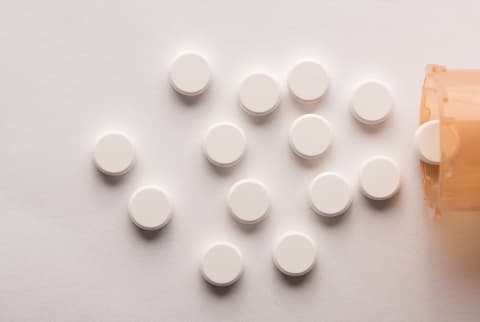Advertisement
Sleep Experts Want You To Know This Shocking Fact About Melatonin Supplements


For those who have trouble falling asleep (read: most of us here in the U.S.), nightly sleep aids hold a certain appeal, with melatonin being one of the most popular. But there are a lot of myths and misconceptions about what supplemental melatonin can and can't do and how much of it should be taken at a time.
Lower doses of melatonin (between 0.5 and 1 milligram) are less likely to cause unpleasant side effects like grogginess and headache or affect hormone health1 over time. But take a stroll through the grocery store and you'll see doses up to 10 times that, which sleep experts say are not safe for long-term nightly use. (Not to mention, they probably won't do much to help your sleep quality in the first place.) A study published in the Journal of Clinical Sleep Medicine in 2017 found another complicating factor when it comes to melatonin supplements: They're often mislabeled.
The research on mislabeled melatonin supplements.
For this study, researchers analyzed 30 melatonin supplements purchased from local grocery stores in Canada (one of the few countries, in addition to the U.S., where melatonin is available without a prescription). They tested to see how the amount of melatonin in the supplement matched up to the amount listed on the bottle.
"Melatonin content was found to be highly variable between samples and lots, with no pattern observed between brand, form of supplement, labeled value, or presence of other herbal extracts," the study's result section reads. The actual amount of melatonin ranged from -83% to +478% across the samples tested—meaning that some had levels that were 478% higher than what was listed on the bottle (while others contained less melatonin than what was promised on the Supplement Facts label).
"Additionally, lot-to-lot variability within a particular product varied by as much as 465%," adds Ellen Wermter, FNP-BC, a family nurse practitioner and spokesperson for the Better Sleep Council.
"Even scarier," Christina Graham, R.N., a registered nurse and Noom coach, says of the eye-opening study, "testing also found serotonin in 26% of the samples. Serotonin is more strictly controlled, and the presence of unlabeled serotonin in significant quantities could lead to serious side effects."
While this study's findings are not exhaustive (do not encompass all melatonin supplement brands), all in all, say Graham and Wermter, this research presents yet another reason to be cautious when taking melatonin supplements. They recommend only using supplemental melatonin for a specific purpose (say, if you're traveling to a new time zone and want to adjust your sleep schedule accordingly) with a set time period in mind and from a reputable brand that prioritizes testing.
If you've gotten into the habit of taking melatonin nightly, it's best to gradually cut back and address the root cause of your sleep issues instead. There are a number of habits that can support your body's natural production of melatonin—from avoiding screens at night to dimming your home lights to doing stress-relieving activities before bed. Keeping your bedroom cool, dark, and quiet can also help make it easier to fall asleep, as can sticking to a regular bedtime schedule. Finally, taking a nonhormonal, melatonin-free sleep aid from a high-quality brand that conducts advanced purity and potency testing can support your rest without the side effects and potential wonky labeling.*
The takeaway.
Melatonin supplements tend to be safest and most effective when taken in low doses, but research shows that mislabeling can occur. Instead of taking the chance on a supplement that has higher doses of melatonin than you signed up for, you can support your body's natural production of the hormone through solid sleep hygiene habits.
